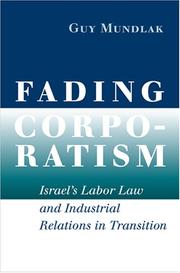| Listing 1 - 10 of 73 | << page >> |
Sort by
|

ISBN: 0801461731 9780801461736 9780801446009 0801446007 Year: 2018 Publisher: Ithaca, NY
Abstract | Keywords | Export | Availability | Bookmark
 Loading...
Loading...Choose an application
- Reference Manager
- EndNote
- RefWorks (Direct export to RefWorks)
Since the 1980's, industrial relations and labor law in Israel have rapidly changed from a European style of corporatism to a model of pluralism familiar to North America. The country's legal and industrial relations systems have become more decentralized, yet more intensively regulated; they are no longer centrally managed, but they do not fit the neoliberal model of a free market. In recent years, a dynamic system for voicing interests has evolved, granting more leeway to individuals, identity-based representation, and a flourishing civil society, but restraining effective collective representation. In Fading Corporatism, Guy Mundlak explains the changing nature of labor law and industrial relations in Israel and the seemingly paradoxical outcomes of transformation as played out in numerous spheres, including the law governing the recognition of trade unions and strikes; the emergence of a human rights regime; and the regulation of temporary work agencies, Palestinian workers from the occupied territories, and migrant workers. Placing the example of Israel in a conceptual framework that draws on the literature of corporatism, Mundlak offers a theoretical coupling of legal studies and industrial relations that will interest scholars and practitioners in both fields. Surveying legal developments from 1920 to the present, Fading Corporatism will also appeal to readers interested in the political, economic, and legal history of Israel. At the same time, Mundlak emphasizes the comparative implications of the Israeli case study. His account is particularly instructive for countries in which traditionally corporatist industrial and legal systems are experiencing similar pressures, such as the Netherlands, Austria, and Germany.
Corporate state --- Industrial relations --- Labor laws and legislation --- Corporations (Corporate state) --- Corporatism --- Corporative state --- Corporativism --- State, Corporate --- Political science --- Syndicalism --- Fascism --- Functional representation --- Travail --- Relations industrielles --- Corporatisme --- Droit
Book
ISBN: 0801465524 0801465966 9780801465963 9780801450921 0801450926 Year: 2012 Publisher: Ithaca, NY
Abstract | Keywords | Export | Availability | Bookmark
 Loading...
Loading...Choose an application
- Reference Manager
- EndNote
- RefWorks (Direct export to RefWorks)
At the close of the twentieth century, Denmark, Finland, and Ireland emerged as unlikely centers for high-tech competition. In When Small States Make Big Leaps, Darius Ornston reveals how these historically low-tech countries managed to assume leading positions in new industries such as biotechnology, software, and telecommunications equipment. In each case, countries used institutions that are commonly perceived to delay restructuring to accelerate the redistribution of resources to emerging enterprises and industries.Ornston draws on interviews with hundreds of politicians, policymakers, and industry representatives to identify two different patterns of institutional innovation and economic restructuring. Irish policymakers worked with industry and labor representatives to contain costs and expand market competition. Denmark and Finland adopted a different strategy, converting an established tradition of private-public and industry-labor cooperation to invest in high-quality inputs such as human capital and research. Both strategies facilitated movement into new high-tech industries but with distinctive political and economic consequences. In explaining how previously slow-moving states entered dynamic new industries, Ornston identifies a broader range of strategies by which countries can respond to disruptive challenges such as economic internationalization, rapid technological innovation, and the shift to services.
High technology industries --- Corporate state --- Industrial policy --- Corporations (Corporate state) --- Corporatism --- Corporative state --- Corporativism --- State, Corporate --- Political science --- Syndicalism --- Fascism --- Functional representation --- Industries
Book
ISBN: 213038773X 9782130387732 Year: 1984 Volume: 2208 Publisher: Paris PUF
Abstract | Keywords | Export | Availability | Bookmark
 Loading...
Loading...Choose an application
- Reference Manager
- EndNote
- RefWorks (Direct export to RefWorks)
Employers and workers organisations --- Firms and enterprises --- Economic schools --- 316.3 --- 321.65 --- 321.7 --- AA / International- internationaal --- 338.314 --- 330.51 --- Corporatieve organisaties. --- Oude en moderne corporatistische systemen. Professionele groeperingen en organisaties. --- Corporatism --- Corporatism. --- Corporatisme --- Corporatisme. --- Corporatieve organisaties --- Oude en moderne corporatistische systemen. Professionele groeperingen en organisaties
Book
ISBN: 1281341460 9786611341466 0191549037 Year: 2008 Publisher: Oxford ; New York : Oxford University Press,
Abstract | Keywords | Export | Availability | Bookmark
 Loading...
Loading...Choose an application
- Reference Manager
- EndNote
- RefWorks (Direct export to RefWorks)
This work offers a provocative argument about the impact of political change on the economic strategies of small states, focusing on Belgium and the Netherlands. It argues that a transformation in the style of politics from consensus to competition has constrained the traditional formulae for economic policymaking.
Corporate state --- Comparative government. --- Belgium --- Netherlands --- Politics and government. --- Economic policy. --- Comparative political systems --- Comparative politics --- Government, Comparative --- Political systems, Comparative --- Political science --- Corporations (Corporate state) --- Corporatism --- Corporative state --- Corporativism --- State, Corporate --- Syndicalism --- Fascism --- Functional representation

ISBN: 1501700359 1501700367 9781501700361 0801493269 9780801493263 0801417295 9780801417290 9781501700354 Year: 1985 Publisher: Ithaca, New York : Cornell University Press,
Abstract | Keywords | Export | Availability | Bookmark
 Loading...
Loading...Choose an application
- Reference Manager
- EndNote
- RefWorks (Direct export to RefWorks)
By the early 1980s the average American had a lower standard of living than the average Norwegian or Dane. Standards of living in the Netherlands, Belgium, Sweden, Switzerland, and Austria also rivaled those in the United States. How have seven small democracies achieved economic success and what can they teach America? In Small States in World Markets, Peter Katzenstein examines the successes of these economically vulnerable nations of Western Europe, showing that they have managed to stay economically competitive while at the same time preserving their political institutions. Too dependent on world trade to impose protection, and lacking the resources to transform their domestic industries, they have found a third solution. Their rapid and flexible response to market opportunity stems from what Katzenstein calls "democratic corporatism," a mixture of ideological consensus, centralized politics, and complex bargains among politicians, merest groups, and bureaucrats. Democratic corporatism is the solution these nations have developed in response to the economic crises of the 1930s and 1940s, the liberal international economy established after World War II, and the volatile markets of more recent years. Katzenstein maintains that democratic corporatism is an effective way of coping with a rapidly changing world, a more effective way than the United States and several other large industrial countries have yet managed to discover.
Book
ISBN: 1626563195 1626563187 9781626563186 9781626563193 1322281386 9781322281384 9781626563179 1626563179 Year: 2015 Publisher: San Francisco : Berrett-Koehler Publishers, Inc.,
Abstract | Keywords | Export | Availability | Bookmark
 Loading...
Loading...Choose an application
- Reference Manager
- EndNote
- RefWorks (Direct export to RefWorks)
Our world is out of balance, says Henry Mintzberg, and the consequences are proving fateful: the degradation of our environment, the demise of our democracies, and the denigration of ourselves, with greed having been raised to some sort of high calling. But we can set things right.Mintzberg argues that a healthy society is built on three balanced pillars: a public sector of respected governments, a private sector of responsible enterprises, and what he calls a plural sector of robust voluntary associations (nonprofits, NGOs, etc.). Communism collapsed because the public sector was overbearing-
Corporate state. --- Democracy. --- Capitalism --- Civil society. --- Social contract --- Self-government --- Political science --- Equality --- Representative government and representation --- Republics --- Corporations (Corporate state) --- Corporatism --- Corporative state --- Corporativism --- State, Corporate --- Syndicalism --- Fascism --- Functional representation --- Social aspects.
Book
ISBN: 9781400868926 1400868920 9780691602608 0691602603 Year: 2015 Publisher: Princeton, NJ
Abstract | Keywords | Export | Availability | Bookmark
 Loading...
Loading...Choose an application
- Reference Manager
- EndNote
- RefWorks (Direct export to RefWorks)
Although the state's role in society has clearly expanded since the 1930s, its independent effect on social structure and change has been given little weight in modern political theories. To bring theory more into line with reality, Stepan proposes a new model of state autonomy which he shows to be particularly well suited for understanding political developments in the Iberian countries and their former Latin-American colonies.Originally published in 1978.The Princeton Legacy Library uses the latest print-on-demand technology to again make available previously out-of-print books from the distinguished backlist of Princeton University Press. These editions preserve the original texts of these important books while presenting them in durable paperback and hardcover editions. The goal of the Princeton Legacy Library is to vastly increase access to the rich scholarly heritage found in the thousands of books published by Princeton University Press since its founding in 1905.
Corporate state. --- State, The. --- Corporations (Corporate state) --- Corporatism --- Corporative state --- Corporativism --- State, Corporate --- Political science --- Syndicalism --- Fascism --- Functional representation --- Administration --- Commonwealth, The --- Sovereignty --- Peru --- Economic policy. --- Social policy. --- Politics and government
Book
ISBN: 0198275900 9780198275909 Year: 1990 Publisher: Oxford [England] ; New York Oxford University Press
Abstract | Keywords | Export | Availability | Bookmark
 Loading...
Loading...Choose an application
- Reference Manager
- EndNote
- RefWorks (Direct export to RefWorks)
Economic policy and planning (general) --- United Kingdom --- Pressure groups --- Lobbying --- Trade regulation --- Cultural pluralism --- #SBIB:316.334.2A470 --- #SBIB:324H44 --- #SBIB:328H214 --- Arbeidssociologie: het sociaal-economisch overheidsbeleid: algemeen --- Politieke structuren: drukkingsgroepen, lobbying --- Instellingen en beleid: Verenigd Koninkrijk --- Great Britain --- Politics and government --- Corporatism
Book
ISBN: 0043210244 0043210252 Year: 1980 Publisher: London Allen
Abstract | Keywords | Export | Availability | Bookmark
 Loading...
Loading...Choose an application
- Reference Manager
- EndNote
- RefWorks (Direct export to RefWorks)
Political philosophy. Social philosophy --- #SBIB:324H20 --- Politologie: theorieën (democratie, comparatieve studieën….) --- Corporate state --- Cultural pluralism --- Democracy --- Self-government --- Cultural diversity --- Diversity, Cultural --- Diversity, Religious --- Ethnic diversity --- Pluralism (Social sciences) --- Pluralism, Cultural --- Religious diversity --- Corporations (Corporate state) --- Corporatism --- Corporative state --- Corporativism --- State, Corporate --- Political science --- Equality --- Representative government and representation --- Republics --- Culture --- Cultural fusion --- Ethnicity --- Multiculturalism --- Syndicalism --- Fascism --- Functional representation

ISBN: 0822952750 9780822952756 Year: 1977 Volume: 119 Publisher: Pittsburgh, Pa University of Pittsburgh Press
Abstract | Keywords | Export | Availability | Bookmark
 Loading...
Loading...Choose an application
- Reference Manager
- EndNote
- RefWorks (Direct export to RefWorks)
Internal politics --- Latin America --- Corporate state --- Authoritarianism --- Politics and government --- Corporations (Corporate state) --- Corporatism --- Corporative state --- Corporativism --- State, Corporate --- Political science --- Syndicalism --- Fascism --- Functional representation --- Authority --- Asociación Latinoamericana de Libre Comercio countries --- Neotropical region --- Neotropics --- New World tropics --- Spanish America --- Corporate state - Latin America - Congresses --- Authoritarianism - Latin America - Congresses --- Latin America - Politics and government - 1948- - Congresses
| Listing 1 - 10 of 73 | << page >> |
Sort by
|

 Search
Search Feedback
Feedback About UniCat
About UniCat  Help
Help News
News